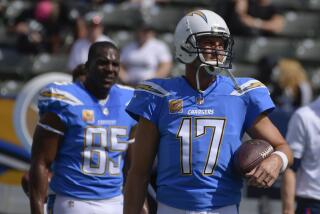Gates closes Microsoft window
- Share via
Bill Gates retired Friday from full-time work at Microsoft Corp. after more than 30 years, closing the books on one of the most extraordinary careers in the annals of business.
With an exceptional combination of technological know-how and bare-knuckled business tactics, Gates succeeded in his audacious drive to put a computer in virtually every home. As the software monolith he started in college grew to become the world’s most valuable company -- at least for a time -- its largest shareholder became the world’s wealthiest individual.
Gates, 52, will remain the chairman of Microsoft, working there one day a week. The other days he will devote to the massive foundation he and his wife started to give away much of their fortune in fights to improve public heath and education, and to reduce poverty.
His transition, begun two years ago when Gates relinquished leadership over research and software architecture, becomes final at a difficult time for the Redmond, Wash.-based company.
Microsoft’s stock is trading where it was 10 years ago. Internet industry executives say the company bungled what would have been the largest acquisition in Silicon Valley history, that of No. 2 search engine Yahoo Inc. And the tech world’s attention has turned to search king Google Inc. and beyond.
Perhaps most surprising, Microsoft appears to be losing ground on the product that it rode to world dominance: the operating system that powers 9 out of 10 personal computers. That dominance both fostered innovation, by giving software developers a sure audience, and squelched it, by steamrollering competitors.
By coincidence, Friday also marked the last full day of general availability of Windows XP, the operating system that Microsoft finally got right. Its year-old successor, Windows Vista, is mocked in Apple Inc. commercials, and even Microsoft’s closest partner, chip maker Intel Corp., has refused to distribute it internally.
Those stumbles echo Gates’ private warnings over the years that the seemingly invincible company could fall.
In the beginning, Gates outsmarted IBM Corp. by giving it a cheap operating system but keeping the right to sell it to other computer companies. And he capitalized on innovations by Xerox PARC researchers, including the introduction of a graphic interface that made computers far more accessible to ordinary people.
Gates made sure Windows kept getting better, even if it could never innovate like Apple. “The guy actually gets the balance between walking too far ahead and making a lot of money,” said Jon Staenberg, a venture capitalist who worked at Microsoft for six years. “And, unlike a lot of other companies, they keep at it and keep at it ‘til they get it right.”
When major challenges came from the Netscape Web browser and the Java programming language, Gates reacted with the full power of Microsoft’s monopoly position, provoking a government antitrust lawsuit that could have split the company but which was settled under the Bush administration.
During the legal battles, Microsoft’s Internet Explorer browser let the company recover from initially missing the importance of the Internet. It failed to recognize the significance of Web search as well, as Gates told Microsoft employees at an emotional farewell with Chief Executive Steve Ballmer on Friday.
“You’ve got to anticipate the turns in the road. We have made many of those turns,” Gates said. “But there’s many we missed. The search and advertising thing . . . that’s probably the one you’d pick right now.”
“Search is the place where people probably really think, ‘Will Microsoft ever do anything there that will be the very best?’ Well, I know we have an incredible team,” he said.
Analysts also fault Microsoft for chasing after too many other lines of business and for missing the importance of consumer taste, the public’s desire for simplicity and the crucial role of marketing -- all subjects mastered by Apple CEO Steve Jobs, whose iPod has revived that company and allowed it to chip away at the edges of Microsoft’s PC market share.
“It’s funny to contrast Bill and Steve and say the perfect super-manager might have been a blend of both,” said consultant Rob Enderle of Enderle Group. “Where Jobs stayed focused on simplicity, but too much, Gates allowed too much complexity and let Microsoft grow into a company that’s almost unmanageable.”
Microsoft has persevered because of its enormous market power, which has yet to be challenged. It has continued to churn out record profit while investing in money-losing games and Internet divisions.
Only recently, as Gates has started to pull away, has Microsoft’s future become hazy. More computing, it seems, will be done where it has less power -- on phones and on off-site computers that render services on demand via the Internet.
In the meantime, there’s always the next version of Windows to make better, and Enderle said there’s every reason to think Apple’s taunting would make the next one great.
When Microsoft gets angry, he said, “it can do some amazing stuff.”
--






